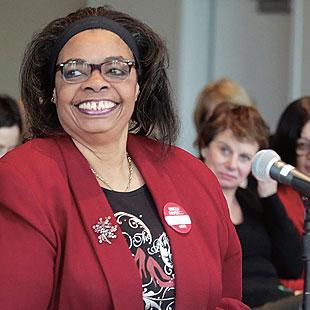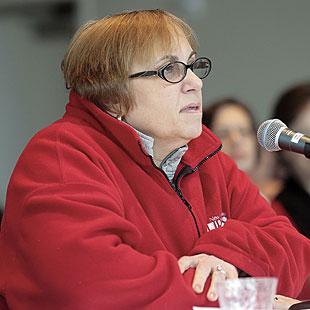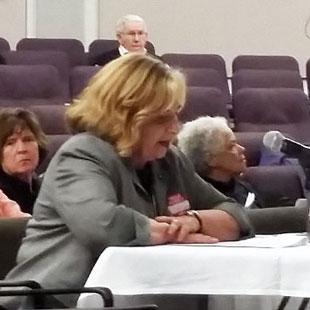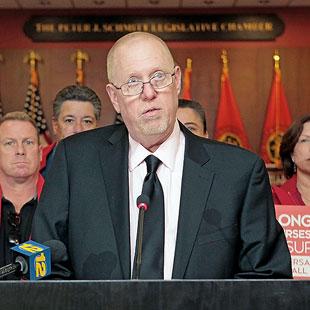Single payer a must
Assemblyman Richard Gottfried is sponsor of New York Health, single payer legislation that promises to replace the commercial health insurance system with one that guarantees universal access for all, has been holding hearings across the state for several weeks eliciting testimony and gathering facts. NYSNA members have appeared before Gottfried, and some of their remarks are excerpted here:

Marva Wade, RN
Marva Wade, RN, Vice President of NYSNA and Member of the Board of Directors
“Year after year, polls show that nurses are the most trusted professionals in the U.S. So I would ask that you invoke that trust, here, now.
“Trust me when I say: We need single payer.
“We need to pass New York Health, for the sake of our patients, their families… and communities across the state.
“Do you know what we see in our hospitals? Healthcare delayed. Why? Because patients with insurance cannot afford care. They stay home and stay sick. Some get very sick. So when they arrive at our hospitals we treat patients with high acuities – unnecessarily severe illnesses.
“That’s right: people are sicker. That’s what our nurses see. That’s a public health crisis rooted in the costs of insurance. Insurance that insures that you stay away.
“Trust me: that makes absolutely no sense. Nurses are saying: enough already.
“We must put in place a healthcare system that gives priority to patient need. Unambiguously. Nurses are here today to calling for a system of care that gives priority to patient need. That is what single payer does. We urge this committee, and all our fellow New Yorkers, to trust the judgment of nurses, your caregivers.”

Anne Bové, RN
Anne Bové, RN, President of NYSNA’s HHC/Mayorals Executive Council, and NYSNA Board Member
“On behalf of my fellow 8,000 nurses in the public system, and thousands more elsewhere in the ranks of NYSNA, we strongly urge the passage of this very important legislation, New York Health. The nurses — frontline caregivers at the eleven Health and Hospital Corporation’s hospitals and other facilities — support single payer.
“We in the public system provide care to one in six New Yorkers, quality care to anyone who needs it, on the basis of need. That’s what single payer is about: providing care on the basis of need. No matter their condition, no matter ability to pay, no matter their immigration status.
“No matter.
“Our public system already has a foot in the door of a single payer hospital system. Actually more than a foot — a leg, an arm… a brain, and a heart. That’s because we give care on the basis of need and provide professional, quality care.
“And we exist largely with payments from Medicaid and Medicare. In many respects, single payer would function as an extension of Medicare: Medicare for All. It’s already working. Quality care. Lower Costs. Universal access.
“And does it work! When New York needed a hospital for the treatment of Ebola, Bellevue was selected. That’s right: a public hospital took the lead. After all, we had trained for these emergencies. Our protocols were in place. Our facilities were ready. Needed additions carried out expeditiously.
“And our nurses were there. Skilled RNs, effective caregivers, who provided essential treatment.
“The patient recovered and went home. And no nurse got sick.
“We are here. No matter.
“A competent, highly-skilled and motivated public system in the nation’s largest city, treating more than a million patients a year. It’s time to extend these values into our healthcare system overall – throughout New York State. It’s time for New York Health.”

Diane Dwire, RN
Diane Dwire, RN, worked in the healthcare field for more than 40 years. Her area of concentration is public health, with experience in direct patient care and in administration as Regional Director of Preventive Health Services in the Syracuse Regional Office of Public Health.
“Gallup released a poll on Monday that was a sad reminder of this nation’s healthcare system: One in three Americans, Gallup reported, have delayed treatment for themselves or a family member due to concerns about cost.
“Those costs are largely the result of sky-high deductibles on insurance policies.
“The health insurance industry no longer serves the interests of our nation. Billions of dollars are spent in administration, accounting, billing and review – far afield from a clinical setting, set apart from the delivery of healthcare, and wasteful beyond comprehension.
“What upsets me so very much, as a nurse and public health administrator, is to see what we lose in this current system, a system dominated by commercial insurance in healthcare. A system that does not value prevention and has not willingly provided reimbursement to providers for preventive health care.
“We forego a comprehensive system of care, one that includes primary prevention, which would enhance our health outcomes. We continually fight for funding of Public health programs for prenatal care and family planning services for all women. If the health care system focused on the fore mentioned services and on other preventive services to reduce chronic diseases such as diabetes, hypertension, heart disease and others, not only would it reduce our health care costs, but people would live healthier and productive lives - and probably happier ones.”

Michael Healy, RN
Michael Healy, RN, is a Critical Care ICU nurse at St. Charles Hospital on Long Island. He is also a member of the NYSNA Board of Directors.
“I’m proud to be a nurse and I wouldn’t trade my experience serving patients for the world.
“We have reached a tipping point in how we deliver health care services in this state, and the time has come to re-organize our system of care so that the priority is patient need and not corporate profits.
“As healthcare professionals, we know what patient need is about. And we can create a rational, comprehensive system built upon that central understanding.
“That is what single payer is all about.
“Under the proposed single payer system, insurance company coverage, premiums, deductibles, co-pays, limited provider networks and out-of-network charges would be replaced with comprehensive, universal coverage for every New Yorker with full choices of doctors and other providers. Instead of paying a health insurance premium, families and employers would pay an assessment based on their ability to pay.
Single Payer Hearing: Albany
January 13 – 10:00 AM
Legislative Office Building, 198 State Street, Albany